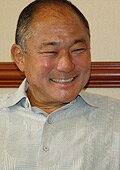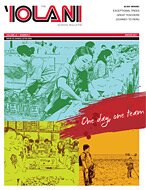This Issue
Winter 2011 - Department | Headmaster’s Column
Headmaster’s Column

…much of the problem-solving involves global wins and local losses, or immediate sacrifices for the benefit of people not yet born.
- J.F. Rischard
Community service is alive and well at Iolani School.
Hundreds of students and adults participate in activities that help people in need and improve the quality of life in our community. New and long-standing programs carry out school-based initiatives, assist social service organizations and work to preserve the natural habitat.
The ‘Iolani Key Club is a well-established community service organization, that has one of the largest memberships on campus. At least a dozen other clubs, in addition to student government committees, have service components as parts of their mission.
Recent developments bode well for this important element in our program.
- Courses such as Economics and Social Entrepreneurship, Concept Physics and Chemistry in the Community require significant social service projects as part of the curriculum.
- The Kukulu Alaka‘i ‘Iolani (“The Creation of Leaders” or KA‘I program) completed its inaugural summer session with thirteen students from Jarrett Intermediate School attending classes and participating in afternoon activities with our students and teachers. The sincere gratitude expressed by the students and their parents at the end of the program was heart-warming.
- Peace Project China has attracted 10-12 students each summer to tutor elementary students in a rural school in Xi’an, China. This program combines service with foreign exposure, creating a powerful learning as well as a teaching experience.
Community service activities and the attitudes they foster may even save our planet. In High Noon, 20 Global Problems 20 Years to Solve Them, J.F. Rischard describes how the world’s population explosion and the new world economy will create shortages of food and water. These forces will intensify a host of other challenges such as poverty, disease, regional conflicts, illegal drugs and competition for limited resources. He sees hope in a new spirit of interdependency in what he refers to as the “global commons.” He argues that nothing short of a global response, free from protectionist strategies of nation states, will get us through the world’s most pressing problems.
We hope not only to broaden their minds, but also to show students the opportunities they have to assume important future roles and responsibilities in their communities.
We are fortunate to live in the richest, most powerful country in the world. America’s responsibility as a world leader has long included foreign policies that aid others in need. Should we do more? Are we willing to give up some of what we have to help others, both at home and abroad? Are we willing to seek new ways to live in order to pass on a safe and healthy environment to our children? Answers to these and other questions will determine our destiny.
‘Iolani is helping to answer such questions positively through its academic excellence and its commitment to service.


